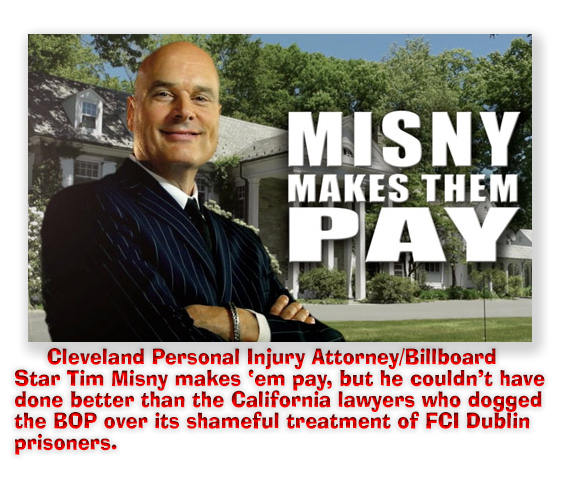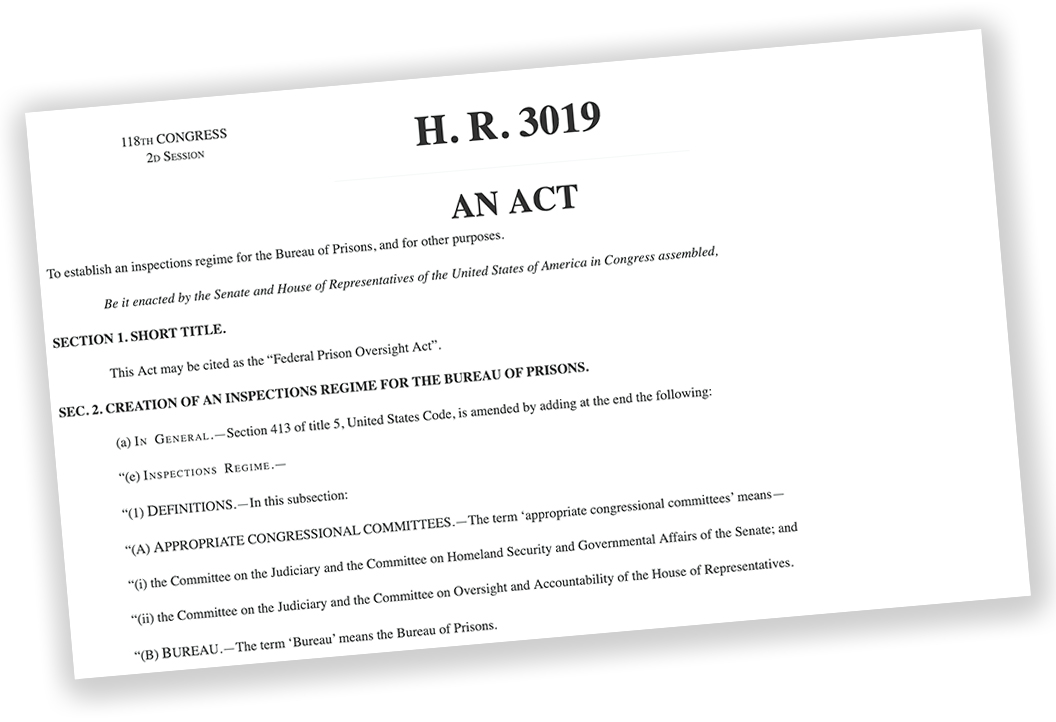We post news and comment on federal criminal justice issues, focused primarily on trial and post-conviction matters, legislative initiatives, and sentencing issues.

INSPECTOR GENERAL REVIEW OF FMC DEVENS YIELDS ANOTHER ‘DOG BITES MAN’ MOMENT
 The DOJ Office of Inspector General began making unannounced inspections of BOP facilities over a year ago, even before the Federal Prison Oversight Act – which requires the OIG to conduct periodic inspections of BOP facilities based on its assessment of the risks such prisons pose to inmates and staff – became law last summer. Last month, the OIG released a report on the its fifth such inspection, conducted last April.
The DOJ Office of Inspector General began making unannounced inspections of BOP facilities over a year ago, even before the Federal Prison Oversight Act – which requires the OIG to conduct periodic inspections of BOP facilities based on its assessment of the risks such prisons pose to inmates and staff – became law last summer. Last month, the OIG released a report on the its fifth such inspection, conducted last April.
For anyone who has experienced BOP healthcare, the report is a real “dog bites man” moment. That may explain how the December 11th report was issued to nearly universal yawns. Writing in Forbes last week, Walter Pavlo noted it in passing, or we would have missed it, too.
The report is harrowing and deserves a full reading.
Devens – located about 33 miles west northwest of Boston – is an administrative-security (houses all security levels of inmates) medical center for prisoners with serious medical or mental health conditions. The facility consists of a federal medical center and an adjacent minimum-security prison camp that provides inmate labor to the medical facility. Both facilities house male prisoners only.
The first prisons the OIG hit in its inspection program were regular prisons, FCI Waseca and FCI Tallahassee (both female facilities), and FCI Sheridan and FCI Lewisburg (male). This time, the OIG said, “We selected FMC Devens as the site of our fifth inspection to better understand and assess the conditions of confinement at [a federal medical facility].”
 We’ve all heard of Doctors Without Borders. The OIG found that the BOP’s variation is “Hospitals Without Doctors.” The report found it “particularly concerning” that Devens had only 76% of its Health Services Department positions filled and had only a single physician “to manage the care of the entire inmate population of approximately 941 inmates: 2 of the institution’s 6 physicians were on extended leave without pay, and 3 other physician positions were vacant.”
We’ve all heard of Doctors Without Borders. The OIG found that the BOP’s variation is “Hospitals Without Doctors.” The report found it “particularly concerning” that Devens had only 76% of its Health Services Department positions filled and had only a single physician “to manage the care of the entire inmate population of approximately 941 inmates: 2 of the institution’s 6 physicians were on extended leave without pay, and 3 other physician positions were vacant.”
Having a Clinical Director would have provided a second physician, but the CD, “who leads the provision of preventive health services and provides standing orders for nurses,” retired two months after the inspection. As of October 5, 2024, the report said, “the position remained vacant… leaving FMC Devens without this critical medical role filled and only one physician at the institution to provide daily patient care.”
This is hardly surprising: a doctor at FMC Devens makes about $282,000 a year. A physician at a nearby hospital emergency department earns about $415,300. Physician assistants and nurse practitioners at FMC Devens earn between $72,000 and $124,000; the same practitioners at a nearby hospital earn an average salary of $141,000.
BOP Director Colette Peters told a Congressional subcommittee last summer that a CO quit Devens to go to work at a local grocery store for better pay.
Half of the pharmacy positions, about a quarter of nursing positions, and the Chief Dental Officer position were vacant. Only 61% of the Psychology Dept positions are filled. The OIG said, “We are concerned that the staffing crisis at FMC Devens has cascading effects on its ability to care for its inmates and limits the quality and quantity of medical services it can provide, including for inmates who were transferred there expressly for its specific medical programs.”
The report also identified “concerns related to the quality of healthcare provided to inmates,” lack of preventive healthcare screening, inappropriate placement of inmates in the Memory Disorder Unit (MDU), and inconsistent processes for requesting and accessing care.” The inspectors found that 57 outside medical appointments for inmates were yet to be scheduled and were on average 53 days overdue at the time of our inspection due to outside medical provider cancellations and a lack of COs to escort inmates to scheduled appointments.
 The OIG found “inconsistencies regarding inmates’ access to medical care,” including routine screening for diabetes and cognitive impairment, and “an apparent inconsistency” in how Health Services determined what constituted a need for sick cal. The report drily observed that “[t]his inconsistency may limit an inmate’s ability to be seen and receive medication in a timely manner, which could negatively affect their overall health.
The OIG found “inconsistencies regarding inmates’ access to medical care,” including routine screening for diabetes and cognitive impairment, and “an apparent inconsistency” in how Health Services determined what constituted a need for sick cal. The report drily observed that “[t]his inconsistency may limit an inmate’s ability to be seen and receive medication in a timely manner, which could negatively affect their overall health.
In 2021, FMC Devens got $150,000 in First Step money to build a LifeSkills Laboratory, a space designed for inmates with serious mental illnesses to practice routine skills. More than three years later, the lab had yet to be used for programming.
Taking government money for a project and then not carrying through can get you convicted if you aren’t the government…
DOJ Inspector General, Inspection of the Federal Bureau of Prisons’ Federal Medical Center Devens (December 11, 2024)
Federal Prison Oversight Act, Pub. L. No. 118-71, 138 Stat. 1492 (2024) (primarily codified at 5 U.S.C. § 413[e] )
– Thomas L. Root






